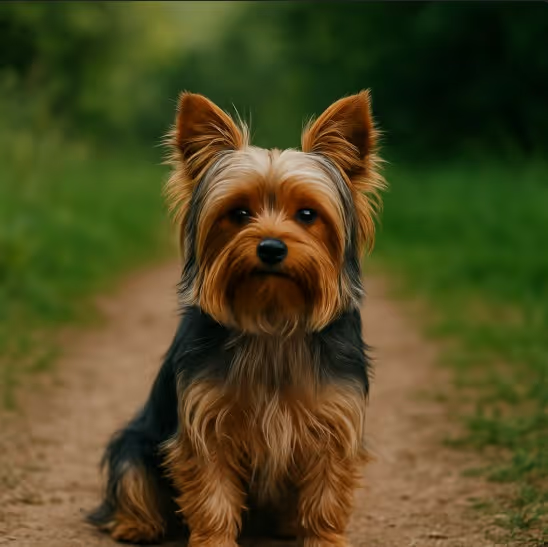The Yorkshire Terrier, or “Yorkie,” is a compact and confident toy breed beloved for its silky coat, charming personality, and fearless spirit. Originally bred for catching rats in 19th-century England, Yorkies have evolved into affectionate lap dogs and loyal companions. Despite their petite frame, they carry a big-dog attitude — alert, spirited, and sometimes bossy. This breed thrives in apartments or homes where they receive consistent attention, grooming, and positive reinforcement training.

The Yorkshire Terrier originated in the mid-1800s in the industrial regions of northern England, particularly Yorkshire and Lancashire. Early Yorkies were larger and used by textile workers to control rat populations in mills. Through selective breeding, especially with smaller terriers like the Paisley and Skye Terrier, the modern, miniature Yorkie was developed. They gained popularity among Victorian high society and have remained a fashionable companion ever since.
Yorkies have hair instead of fur, which requires daily care to avoid tangles and matting. Their coat grows continuously and must be trimmed regularly unless kept in a show cut.
Grooming Recommendations:
Yorkies are small, but energetic. They require short bursts of daily exercise and mental stimulation.
Despite their intelligence, Yorkies can be stubborn. Early and consistent training is key to managing barking and independence.
Training Recommendations:
💡 Tip: Yorkies may bark frequently; train a “quiet” command early on
Due to their small size and fast metabolism, Yorkies benefit from multiple small meals per day.
Look for Yorkie-specific rescues or responsible breeders.
What to Look for in a Breeder:
🏡 Yorkie Rescue Resources:
1. Are Yorkshire Terriers hypoallergenic?
Yes — they are considered hypoallergenic due to their hair-based coat.
2. How often should I groom my Yorkie?
Daily brushing is recommended. Most owners also schedule trims every 6–8 weeks to prevent matting.
3. Are Yorkies good for apartment living?
Absolutely. Their small size and low exercise requirements make them excellent urban companions.
4. Do Yorkies bark a lot?
Yes — they’re naturally alert. Early training can reduce excessive barking.
5. Are Yorkies good with children?
Yes, with supervision. They are best with older, respectful children due to their small size.